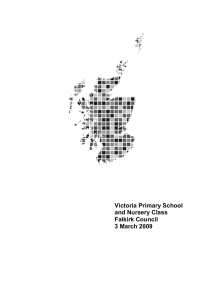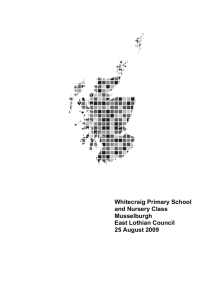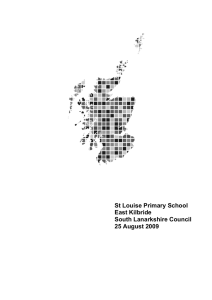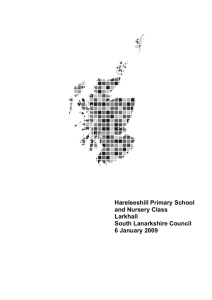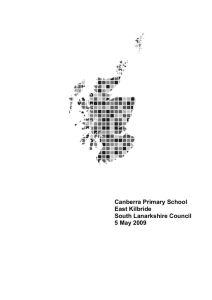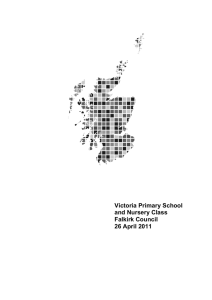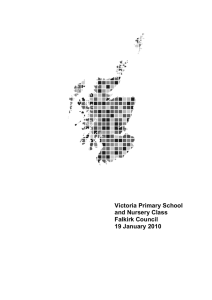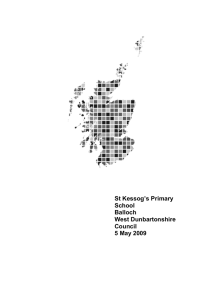East Plean Primary School and Nursery Class Plean
advertisement
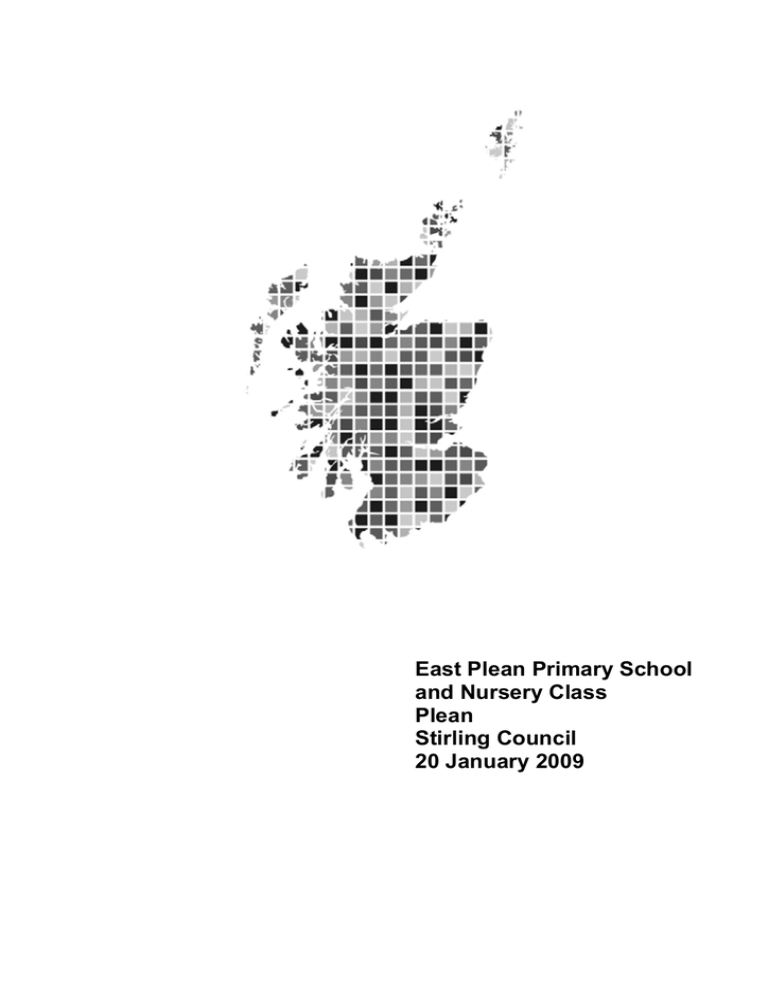
East Plean Primary School and Nursery Class Plean Stirling Council 20 January 2009 This report tells you about the quality of education at the school1. We describe how children benefit from learning there. We explain how well they are doing and how good the school is at helping them to learn. Then we look at the ways in which the school does this. We describe how well the school works with other groups in the community, including parents2 and services which support children. We also comment on how well staff and children work together and how they go about improving the school. Our report describes the ‘ethos’ of the school. By ‘ethos’ we mean the relationships in the school, how well children are cared for and treated and how much is expected of them in all aspects of school life. Finally, we comment on the school’s aims. In particular, we focus on how well the aims help staff to deliver high quality learning, and the impact of leadership on the school’s success in achieving these aims. If you would like to learn more about our inspection of the school, please visit www.hmie.gov.uk. Here you can find analyses of questionnaire returns. Where applicable, you will also be able to find descriptions of good practice in the school. 1 2 The term ‘school’ is used to include the work of the nursery class, where relevant. Throughout this report, the term ‘parents’ should be taken to include foster carers, residential care staff and carers who are relatives or friends. Contents 1. The school 2. Particular strengths of the school 3. Example of good practice 4. How well do children learn and achieve? 5. How well do staff work with others to support children’s learning? 6. Are staff and children actively involved in improving their school community? 7. Does the school have high expectations of all children? 8. Does the school have a clear sense of direction? 9. What happens next? 1. The school East Plean Primary School is a non-denominational school with a nursery class which serves the town of Plean. The inspection was carried out in November 2008 at which time the roll was 189, including 40 in the nursery. Children’s attendance was well below the national average in 2006-07. 1 2. Particular strengths of the school • Welcoming atmosphere. • Staff’s commitment to the care and welfare of the children. • Use of the local environment and celebration days to make learning interesting. • Commitment to involving parents in the work of the school. 3. Example of good practice • Range of initiatives to involve parents in the work of the school. 4. How well do children learn and achieve? Learning and achievement Children are making good progress in the nursery class. They communicate well in talking and in early writing. A few confidently use numbers in their play and most can recognise and sort simple shapes. Children use the outdoor environment well to explore aspects of nature. Most children are developing good creative skills in music and art. In the primary classes, the majority of children are progressing well in listening, talking, reading and writing. At all stages, a few children are not sufficiently challenged and are not making good enough progress in their learning. Most children listen well to their teachers. However, in a few classes a minority of children do not listen well and their behaviour interrupts the flow of lessons. Across the school, 2 children are learning to read and write for a wide range of purposes. In mathematics, most children are attaining minimum national levels. Children at the early stages are developing their early numeracy skills well. Children in P4 to P7 are making steady progress in most aspects of mathematics. By P7, children are not secure in their use of percentages, angles and measurement. Children’s skills in mental and written calculations are not consistently well developed. At all stages, they confidently work with 2D and 3D shape. By P7, almost all children show good skill in extracting and using information from graphs. Across the school, children are developing appropriate problem solving skills. Children’s skills in information and communications technology are beginning to develop. Staff now need to support and encourage them further in this area. Children understand the importance of being healthy and of keeping themselves safe. All children respond well to opportunities to develop their achievements within the school day and through after-school activities such as judo, Scottish country dancing, guitar and a range of sporting activities. Older children are developing citizenship skills and a sense of responsibility by serving on various school committees and by being house captains, buddies and peer mediators. Curriculum and meeting learning needs Teachers are beginning to work well together to review and improve the curriculum. Children in the nursery follow a varied and appropriate curriculum. Staff in the nursery are beginning to take account of children’s own interests when organising learning, and children respond well. The whole-school initiative Celebration days effectively link different aspects of the curriculum to make learning meaningful and interesting for children. At the primary stages, teachers are making learning more stimulating by increasing the number of practical activities. The quality of these activities are not always sufficiently high to support and extend children’s learning. Children’s literacy and numeracy skills are not being well enough developed. Personal and social development and health promotion have a strong focus across the school. The school is committed to moving towards providing two hours of physical education in line with the national expectation. 3 Enterprise skills are well developed throughout the school and are strengthened by the increasing use of group challenges in class. Helped by a range of visits and visitors, children are learning effectively about their local environment and its culture. Staff very effectively meet children’s emotional and social needs. Overall, children’s learning needs are being adequately met. A significant minority of children are being well supported through the nurture group and other small group work. Support for learning staff identify children’s learning needs well. They work closely with children to discuss their progress and set targets. However, these targets are not always focused well enough on specific learning needs. Parents whose children have additional support needs are appropriately involved in reviewing progress and in planning next steps in their learning. Support for learning assistants provide good support but they need to be used more flexibly across the school to ensure that the needs of all children are met. Most nursery activities are set at the right level, but some of the older children are not challenged enough in their learning. Children in the primary classes are making steady progress in their learning but high-achieving children could be making faster progress. Children respond very positively when given interesting tasks to do and are developing the skills necessary for working in groups. However, many of the tasks and activities which children undertake in the classroom do not build well enough on prior learning. Children are not sufficiently involved in discussing their work and are not clear about what they need to do to improve their learning. Staff are beginning to involve children more in planning what they are going to learn in environmental studies topics. Children complete homework regularly and particularly enjoy the homework challenges, which are activity based tasks. 5. How well do staff work with others to support children’s learning? The school has developed very positive partnerships with parents and the community. The Parent Council works closely with staff to support 4 the work of the school. Parents are given helpful information about the curriculum through well designed leaflets. Children also give informative presentations to parents about what they are learning in school. A few parents help in the school library and organise story sacks for the children. The local community and parents played a major role in developing the school grounds to enhance children’s learning and physical activity. The school works well with a wide range of outside agencies to help meet children’s social, emotional and learning needs. Children’s social development is enhanced through organised contact with children from other local schools. Children are supported very well to make a confident and successful move from nursery to primary and to Bannockburn High School. 6. Are staff and children actively involved in improving their school community? Staff are committed to improving the school. As a team, they work well together to meet children’s emotional and social needs. Children are happy with how school staff deal with any concerns they raise. Children respond well to opportunities to take on responsibilities within the school. Older children help look after the younger ones through buddying and peer mediation. Children at different stages take an active part in the eco committee. The eco committee plays a major role in promoting sustainable developments throughout the school, such as saving energy. House Captains lead a range of activities and motivate their peers. Children are not yet contributing enough to discussions on how to improve their learning. Across the nursery and primary school, staff regularly reflect on their work and on activities they provide for children. They are beginning to make changes to their practice to improve the quality of experiences for children. 7. Does the school have high expectations of all children? Children and staff are proud of their school and its achievements. Children reported that they are treated fairly and that they feel safe in 5 school. Through the sensitive work of a number of adults, children are well cared for in school. Staff encourage children to work hard through a variety of methods such as awarding house points. A few teachers promote positive behaviour well but this is not consistent practice across all classes. Not all staff have high enough expectations of children’s behaviour and progress in learning. Systems to encourage appropriate behaviour are not working well in all classes. The weekly school assembly is developing children’s understanding of the school’s values and of other cultures as well as providing good opportunities for religious observance. Staff are confident in their knowledge of child protection procedures. There are appropriate procedures in place to monitor children’s attendance at school but not yet to encourage attendance. 8. Does the school have a clear sense of direction? The headteacher provides very positive and supportive leadership. She has helped ensure some improvements in the performance of the school. She is aware of the school’s strengths and areas for development and is committed to further improvement. She relates very well to children and shows high commitment to their care and welfare. The depute headteacher effectively supports the work of the school. She fulfils her remit well and her teaching is a model of good practice. The work of the writing coordinator is having a positive impact on developing children’s writing skills. Staff are committed to the school community and provide a high level of care for children. They have not yet ensured sufficient improvements in children’s attainment and learners’ experiences. The headteacher needs to provide staff with a clear strategic direction for improving learning and teaching. There is a need for staff to work together to evaluate and improve teaching approaches. They need to identify next steps in children’s learning based on rigorous assessment and monitor children’s progress in learning more carefully. 6 9. What happens next? We are confident that the school, with support from the education authority, will be able to make the necessary improvements in light of the inspection findings. As a result, we will make no more visits following this inspection but will monitor progress. The school and the education authority will inform parents about the school’s progress in improving the quality of education. We have agreed the following areas for improvement with the school and education authority. • Further develop effective learning and teaching approaches, including more opportunities for children to develop the skills to be independent learners. • Raise attainment in English language and mathematics. • Improve approaches to target setting for children with additional support needs by identifying clear and measureable learning targets. • Ensure approaches to promoting positive behaviour are consistently used at all stages. • Develop rigour in self-evaluation to bring about improvement in learners’ experiences. At the last Care Commission inspection of the nursery class there were three requirements, all of which had been addressed. In addition, one recommendation was made, and this had been addressed. 7 Quality indicators help schools and nursery classes, education authorities and inspectors to judge what is good and what needs to be improved in the work of a school and a nursery class. You can find these quality indicators in the HMIE publications How good is our school? and The Child at the Centre. Following the inspection of each school, the Scottish Government gathers evaluations of three important quality indicators to keep track of how well all Scottish schools and nursery classes are doing. Here are the evaluations for East Plean Primary School and Nursery Class. Primary school Improvements in performance Learners’ experiences Meeting learning needs satisfactory satisfactory satisfactory Nursery class Improvements in performance Children’s experiences Meeting learning needs satisfactory satisfactory satisfactory We also evaluated the following aspects of the work of the school and nursery class. The curriculum Improvement through self-evaluation HM Inspector: Belinda Greer 20 January 2009 8 satisfactory satisfactory To find out more about inspections or get an electronic copy of this report go to www.hmie.gov.uk. Please contact the Business Management and Communications Team (BMCT) if you wish to enquire about our arrangements for translated or other appropriate versions. If you wish to comment about any of our inspections, contact us at HMIEenquiries@hmie.gsi.gov.uk or alternatively you should write in the first instance to BMCT, HM Inspectorate of Education, Denholm House, Almondvale Business Park, Almondvale Way, Livingston EH54 6GA. Our complaints procedure is available from our website www.hmie.gov.uk or alternatively you can write to our Complaints Manager, at the address above or by telephoning 01506 600259. If you are not satisfied with the action we have taken at the end of our complaints procedure, you can raise your complaint with the Scottish Public Services Ombudsman (SPSO). The SPSO is fully independent and has powers to investigate complaints about Government departments and agencies. You should write to SPSO, Freepost EH641, Edinburgh EH3 0BR. You can also telephone 0800 377 7330, fax 0800 377 7331 or e-mail: ask@spso.org.uk. More information about the Ombudsman’s office can be obtained from the website at www.spso.org.uk. This report uses the following word scale to make clear judgements made by inspectors. excellent very good good satisfactory weak unsatisfactory outstanding, sector leading major strengths important strengths with some areas for improvement strengths just outweigh weaknesses important weaknesses major weaknesses Crown Copyright 2009 HM Inspectorate of Education

